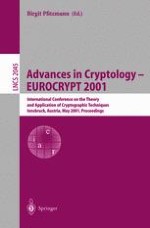2001 | OriginalPaper | Buchkapitel
Priced Oblivious Transfer: How to Sell Digital Goods
verfasst von : Bill Aiello, Yuval Ishai, Omer Reingold
Erschienen in: Advances in Cryptology — EUROCRYPT 2001
Verlag: Springer Berlin Heidelberg
Enthalten in: Professional Book Archive
Aktivieren Sie unsere intelligente Suche, um passende Fachinhalte oder Patente zu finden.
Wählen Sie Textabschnitte aus um mit Künstlicher Intelligenz passenden Patente zu finden. powered by
Markieren Sie Textabschnitte, um KI-gestützt weitere passende Inhalte zu finden. powered by
We consider the question of protecting the privacy of customers buying digital goods. More specifically, our goal is to allow a buyer to purchase digital goods from a vendor without letting the vendor learn what, and to the extent possible also when and how much, it is buying. We propose solutions which allow the buyer, after making an initial deposit, to engage in an unlimited number of priced oblivious-transfer protocols, satisfying the following requirements: As long as the buyer's balance contains sufficient funds, it will successfully retrieve the selected item and its balance will be debited by the item's price. However, the buyer should be unable to retrieve an item whose cost exceeds its remaining balance. The vendor should learn nothing except what must inevitably be learned, namely, the amount of interaction and the initial deposit amount (which imply upper bounds on the quantity and total price of all information obtained by the buyer). In particular, the vendor should be unable to learn what the buyer's current balance is or when it actually runs out of its funds.The technical tools we develop, in the process of solving this problem, seem to be of independent interest. In particular, we present the first one-round (two-pass) protocol for oblivious transfer that does not rely on the random oracle model (a very similar protocol was independently proposed by Naor and Pinkas [21]). This protocol is a special case of a more general “conditional disclosure” methodology, which extends a previous approach from [11] and adapts it to the 2-party setting.
